
|
|
Delico's Nursery
 Not quite the new Rugrats reboot you thought it would be. Anime has such an interesting ecosphere compared to other types of shows. Every half-decade or so, a new niche sub-genre of anime appears out of the void and really takes off in popularity for a bit. This could be because groups of manga authors find themselves on the same wavelength, or because one successful show paves the way for more of its kind, or - most probably - because production studios simply like to capitalize on a gimmick while it's still hot. Whether it's office job rom-coms, new deconstructive takes on magical girls, or high schoolers getting raptured and waking up in a video game world, we're always just a few years away from the next big wave. In recent years, stories about parenting under unusual circumstances have become a thriving scene, often in conjunction with danger and intrigue. Major hits like Spy x Family and Buddy Daddies suggest a generation that grew up on feel-good action cartoons for the whole family (such as The Incredibles or The Secret Saturdays), while lesser-lauded titles like My Home Hero and TsumaSho explore some of the darker, more complex sides of being a parent. These trends continue with their own unique spin in Delico's Nursery.
 There is an immense satisfaction to be taken in watching smug bastards be humbled by the most mundane of household tasks. Surprisingly adapted NOT directly from a manga, novel, or game, but (originally) a stage play, Delico's Nursery is a story about a group of nobles working a supernatural murder mystery case while also watching their kids. Supposedly these aristocrats are all vampires (of a sort), granted certain supernatural strengths by virtue of their "dark" heritage, but since this isn't really a story ABOUT vampires, you can forget about all the usual Transylvanian tropes. This is a story about working fathers making time to raise small children, using aristocracy and conspiracy as a backdrop. The titular Delico (Dali by first name) is the head of a prestigious estate who, after losing his wife, takes on the promise of raising his two children in her absence. When he rejects the call from his local Lord for his services in uncovering the identity of a serial murderer, his fellow nobles show up at his door to demand his assistance. Ever the smug rogue, Dali decides that the impossibility of both managing an investigation and being an attentive father is a challenge to be risen to, but he'll only do it on one condition: the rest of his posse must join in as well, turning their headquarters into a full-blown nursery.
 Trying to silence a baby is like trying to command a pokemon who out-levels your highest gym badge. Learning the same set of skills they hired their various house servants for (nannies, cooks, surrogate mothers, etc), these four princely prettyboys must navigate every aspect of child-rearing from changing diapers and playing pretend to communicating their feelings and mitigating jealousy between siblings, all while closely monitoring the ongoing string of murders in the world outside. Interestingly, the show's story doesn't try to tie these two core elements together thematically, giving the story an extra layer of complexity by deftly balancing both in equal measure. And - provided you're not the type of person who hates multi-genre shows - it really pays off for both sides of the story. The parenting aspect goes beyond watching rich bitches struggle with housework, and the murder mystery aspect dives into some difficult and even heady concepts once the supernatural angles start to come into focus. I don't see a lot of discussion about this show in larger anime circles (outside of one memetic concept that I'll touch on in just a bit), but I know from experience with other genre-blending shows that many people are fickle in their opinions, and generally prefer a show to lean more in one direction than the other so they can know what to expect from it. Based on the many disparate inspirations that it draws from, Delico's Nursery is not a show for people who hold those expectations.
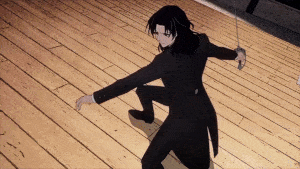 What do you mean not all parents know how to swordfight? Right off the bat my attention was drawn to the show's extravagant art style. Characters are drawn in a decidedly non-anime fashion, more akin to realism than stylization, and the show is set on a stage of extremely busy and maximalist backgrounds. There's such a fine level of detail on display that keenly reflects the characters' lavish setting while also suggesting the messy and complicated situation each one is dealing with. I was drawn in particular to the hair styles, especially of the children. Equal parts flowing like royalty and tangled like messy rugrats, there's a distinctive unifying and somewhat androgynous look to everything that really nails the setting the show is going for. I've noticed over the years that Japan has a strange fascination with European aristocracy (somewhat similar to Americans' fascination with Asian culture), and that Japan's traditional brand of presentation in anime and video games fuses very nicely with these Western aesthetics. This is plainly evident in beloved classics like Castlevania and The Legend of Zelda, all the way up to more over-the-top productions like Bayonetta. I remember a lot of anime from the mid-00s calling on this specific stylization (Rozen Maiden and Vampire Knight come to mind), and whether or not Delico's Nursery specifically drew on that era for inspiration, it certainly feels like a welcome throwback to it.
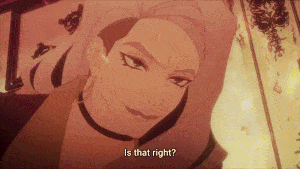 Pun intended, but DAMN the animation team was on fire for this one. Aside from all the extremely cool production aspects and general vibe of the series though, what really sticks out to me is the show's intriguing story elements and what it's willing to explore within its unusual setting. As the details of the murder mystery begin to take form, we learn that the culprit is not a single person, but a group known as Pendulum. Composed mostly of outcast vampires and one dhampir (a mixed-heritage offspring of vampire and human), Pendulum gives off the vibe of a polycule of anarcho-queers living outside the system and working on a plot to kill god. No, seriously. Vampire society in this show stems from a singular progenitor, a godlike immortal to whom all other vampires are linked mentally. The sway that vampires hold over others in this show is based on a concept referred to as "initiative". Once bitten, the victim is beholden to the vampire's command. This progenitor vampire (the "True of Vamp") effectively created all of vampire society by holding initiative over all other vamps, and his mental state directly affects everyone else's as a result. Dali and his cohorts are employed as members of an Agency dedicated to keeping this god's identity and sanity safe, which - given that Dali was chosen to investigate these murders - suggests that the culprits may be up to something VERY dangerous.
 I am pleased as punch that this show continues the tradition of a character's first command when controlling someone else is to make them dance for their amusement. Circling back to the "memetic concept" I alluded to earlier, one extremely awkward aspect about this show - for me as an American - is that the progenitor god, the "True of Vamp", is referred to in shorthand as "TRUMP". The phrase "True of Vamp" - "of" being a vestigial artifact of Japanese-to-English - becomes the portmanteau "Trump", unintentionally invoking the name of one of the most incompetent presidents of my lifetime. This creates a number of ridiculous and heavily memeable moments in the subtitles, and might be the only reason most people are even aware of this anime's existence. I'm reasonably certain this was unintentional though, because the word "Trump" has several other meanings and uses both in English and Japanese that make sense here. For one, "Trump" is a term often used in playing cards, used to denote a specific card or suit (the Ace of Spades, for example) that beats the others in value by default. This ties into the show's "initiative" concept, wherein one vampire's will trumps another's. Also worth mentioning that the Japanese pronunciation of "trump" ("toranpu") translates literally as "playing cards", so yeah. The rest of this review may be a bit awkward to read because I'm not going to pussy-foot around using the name Trump going forward. Just pull up your pants and power through it with me.
 This is also the name of the original stage play, so adjust yourself to the sight of it with this cool little graphic from the intro. Full spoilers to follow. The unofficial leader of Pendulum is a dhampir named Shad Juras. One of only three survivors of a horrific tragedy at a village of dhampirs (Nebula), Juras is a powerful - but frail - victim of circumstance living on borrowed time and fueled only by an unquenchable hate for Trump. The tragedy of Nebula was a sudden mass murder committed by its members abruptly turning on each other, and Juras claims to have seen Trump in person at the scene, convinced that Trump's poor mental state and initiative over all vampires (including half-vamps) drove them to slaughter each other. With most dhampirs living unfortunately short lives due to their mixed heritage, Juras vows to channel his unyielding hatred into vengeance, and seeks to use a special power of his to somehow kill the unkillable. He joins up with Pendulum not because they share this hatred, but because they possess a certain means of unlocking this power and - living as a group of outcasts and criminals anyway - may be able to help him locate Trump and enact his revenge before his inevitable early death.
 Even the fight scenes in this show are opulent and grandiose, really tying the overall vibe of the show together. Pendulum's other members aren't necessarily interested in killing Trump so much as they are rejecting the norms of vampire society. It's never quite explained in great detail, but vampires in this universe enter a "cocoon" phase similar to puberty that manifests in the form of unusual abilities and delusions, and eventually grow out of it when they reach adulthood. Pendulum have somehow acquired a stash of strange pills that enable them to "revert" to their cocoon phase, making them feel an inexplicable euphoria as well as granting them superhuman abilities. In Juras' case, his ability allows him to "share" his hallucinations with anyone he touches, entering a sort of psychic mind-meld state wherein he can interact with them on a subconscious level. For most of his life he's seen this as a curse, finding out as a young child that the girl he fawned over was romantically attracted to someone else, but in his dying days, sees this as a means to potentially carry out his revenge. While Trump may be unkillable physically, Juras' hunch is that he can break him mentally, leaving him a walking vegetable as his final act of retribution.
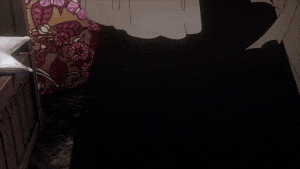 Love the way the antagonists form a family, in the sense that they all care about each other, but still have differences of opinion and certain lines that should never be crossed. Dali and company (collectively, the "Vlad Agency", for which the Japanese pronunciation amusingly sounds like "Blood Agency" - very on the nose for a vampire organization) seek to stop this at all costs, knowing full well that tampering with Trump's mental state could result in another tragedy like Nebula, potentially wiping out all of Vampkind in the process. Whether Juras knows or acknowledges this is irrelevant, as his pure spite seems to be the only thing keeping him alive to begin with. As an aside, it's remarkable that the show barely ever mentions non-Vampire humans, in the sense that they are simply not a major part of the story, not even for our cast of so-called Vamps to feed on. Street vendors can be seen selling jars of animal blood for vampires to drink, and Dali's own cooks prepare him a meal of "duck blood soup", completely subverting the usual conventions of vampire stories, almost like it's simply borrowing the concept as a shorthand stand-in for nobility.
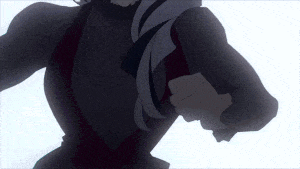 There may not be much traditional vampire action in this show, but at least it remembered to make it appropriately queer in nature. The flip side of all this (the show's primary story) focuses on how these so-called vampires represent the concept of "noblesse oblige" - that is, the notion that privileged elites have a certain obligation to act with nobility and generosity to those without such privilege. Our main cast of aristocratic prettyboys aren't there to lord their superiority over the common folks, nor engage in petty power struggles to maintain their place at the top of society. They accept their position as such in order to stop the common folks from interacting with Trump, on the basis that crowds of normies begging him for eternal life might set him off and result in a collapse of vampire society, should his initiative unintentionally make everyone suicidal or something like that. Of course, the kicker is that injustice still exists in this world, and most of it stemming from either the class divide of nobles and commoners, or from the fact that people can still be controlled via another vampire's initiative. Insofar as it's explained, the initiative concept is not based on a hierarchy or "power level", but seems to operate on a first-come first-served basis. That is, if someone is bitten and commanded to never reveal any information regarding Trump under coercion, then that command cannot be superseced by a "more powerful" vampire. The trick seems to be either getting the first bite, or issuing the right command. Either way, understanding this system is crucial to understanding the stakes of the story at play.
 Forgive them father, for they know full well what they do; they're just conveniently under hypnosis by a rival vampire. And that's not to even mention perhaps the most important part of the story: the nursery itself. Unraveling the whole mystery of vampiredom happens entirely in tandem with Dali and his crew struggling to understand and raise their children. Some, like the laidback Henrique, have it easier than others - though he has two children, they are twins, and extremely social ones at that. Others, like the emotionally distant Dino and the stern go-getter Gerhard, struggle with communicating clearly and setting unrealistic expectations for their young boys. Underneath his ultra-confident façade, Dali himself worries that he might not be the superstar he claims to be if he can't always predict how to solve any parenting issue he may be faced with. The writing for the children is exceptionally good as well. Dali's older son Raphael harbors the same grudge any five-ish-year-old with a newborn sibling might: that dad will be too busy paying attention to the high-maintenance baby to pay attention to him as well. This leads to a somewhat late "no" phase that most kids go through the minute they learn the word "no", and even triggers a sort of resentment in Raphael for his baby brother. I was glued to my seat watching him sneak out with the baby in his arms, intending to "get rid of him" while the adults were knee deep in the investigation, and found myself pleasantly surprised by how nuanced his feelings were portrayed as a result. (In case you were worried, little baby Ul is fine).
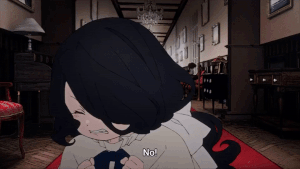 Slap that baby, make him pee. Likewise, Theodore represents the type of kid forced to grow up too quickly. Already seeing the hallucinations associated with cocoon phase at only seven years old, Theo is haunted by a group of stuffed animal shaped demons who keep chiding him about how he's still a kid and shouldn't be acting like an adult yet. Following the strict expectations set by his father - himself emotionally stunted and distant due to having extremely poor luck with wives leaving him - Theo asserts over and over that he's not a child, and often refuses to play with the other kids in favor of studying, all while ignoring the mocking voices of the demons only he can see. Honestly, each of the kids is written in a subtle and realistic way - not in the sense that they act EXACTLY like realistic children, but that they clearly represent the way children often think and feel compared to the adults in their lives. One key aspect of parenting is that it's very much a give-and-take kind of thing. Parents are responsible for teaching and raising children, but parents are still people too, and must still struggle and deal with their own problems to boot. As kids learn and grow as people, so too do their parents. Delico's Nursery clearly understands this, and it's reflected beautifully in the way it depicts the ever-evolving relationship between parents and their kids. ...well, at least from my point of view, as someone who is NOT a parent but has strongly mixed convictions about how my own parents did their best to raise me.
 You're never too young to start facing your demons, but if even your demons are telling you to slow down, maybe it's a good idea to listen to them. Anyway, to wrap it all up, Delico's Nursery is a wonderfully unique production of the modern anime era that really took me by surprise this season. The blend of non-traditional art style with the haunting Yuki Kajiura-esque gothic soundtrack really took me back to the experimental era of the early 00s, and even upped the ante by adding 3D rendered backgrounds for extra detail and clarity during the show's stunningly choreographed fight scenes. And even with all this focus on production, it still manages to deliver a well-balanced and finely detailed story, taking full advantage of the anime toolset in the process. If there's any downside to the show whatsoever, it's that it will undoubtedly be too "different" for a lot of folks to really latch onto it. Like other genre-bending titles of its nature (Undead Murder Farce and games like Vampire: The Masquerade come to mind), it's too spread out and too nuanced to be just one of the things it's listed as, which is always a PLUS in my book, but I understand that's not true for everyone. That said, I urge you to at least give this series a fair chance, since it's going to be decidedly unlike anything else you'll watch this year.
 Much like real life, when one child cries, they all start crying. So...don't watch this show if you're a child, I guess? As for my follow-up recommendations, I think my top pick would easily have to be a 2006 series by the name of Le Chevalier D'Eon. Set in the era of the French Revolution, D'Eon centers on the exploits of a group of musketeers seeking closure for the murder of one man's sister (whose spirit occasionally possesses him in the heat of battle). During their quest, they stumble into a nefarious plot by other nobles who are attempting to create a new world order using some kind of dark magic. Much like Delico, both shows focus on European-inspired aristocracy with a hint of magic and use a striking, decidedly non-traditional art style. Other good recommendations include the aforementioned Undead Murder Farce, especially if you like character-driven affairs with a bit more sass and supernatural fuckery. If there wasn't enough vampire for you in this show supposedly about vampires, there's always Castlevania (fair warning though, it's FAR more violent and somewhat less approachable than Delico). It's hard to think of any other non-anime examples, since American cartoon culture generally doesn't mesh well with adult-centered stories about aristocracy, but Gargoyles is about as close as you can get tonally, and I think fans of one would definitely dig the other.
 Never forget the power you as an adult wield over children. Noblesse oblige indeed. On a final note, I couldn't find a good place elsewhere in the review to segue to this, but I want to expand a little more on what I meant when I referred to Pendulum as an anarcho-queer polycule, because I know nobody else is talking about it and HOLY SHIT it seems so obvious when you spell it all out. Juras comes from a village of impoverished and discriminated outcasts who are "more susecptible to congenital diseases", all but directly referencing gay people and the horrific history they've had with the AIDS crisis. Outside of Juras' plan to kill Trump, Pendulum's entire modus operandi is staying in "cocoon phase" for as long as they can using special pills - an easy allegory for HRT. Then you have the outfits: Catarina dressed in feminine attire despite having a strong muscular build, Kiki going for the gothic lolita look, and Abraham wearing a scarecrow-esque mask - all of them feel like common tropes and in-jokes for various queers, drag queens, trans girls, and nonbinary folks. And as a bonus just for us queers, there's a dream sequence during the finale where all the nursery children have grown into young adults, and Ul has made close friends with someone named Sophie, who has a somewhat androgynous appearance, masculine pronouns with a feminine name, and kisses Ul on the cheek like a young lover, which probably means exactly what you think it means. Like, come on! I CAN'T be the only one who sees all these clear queer parallels, right?! Anyway, just fucking watch this show already!
|
|